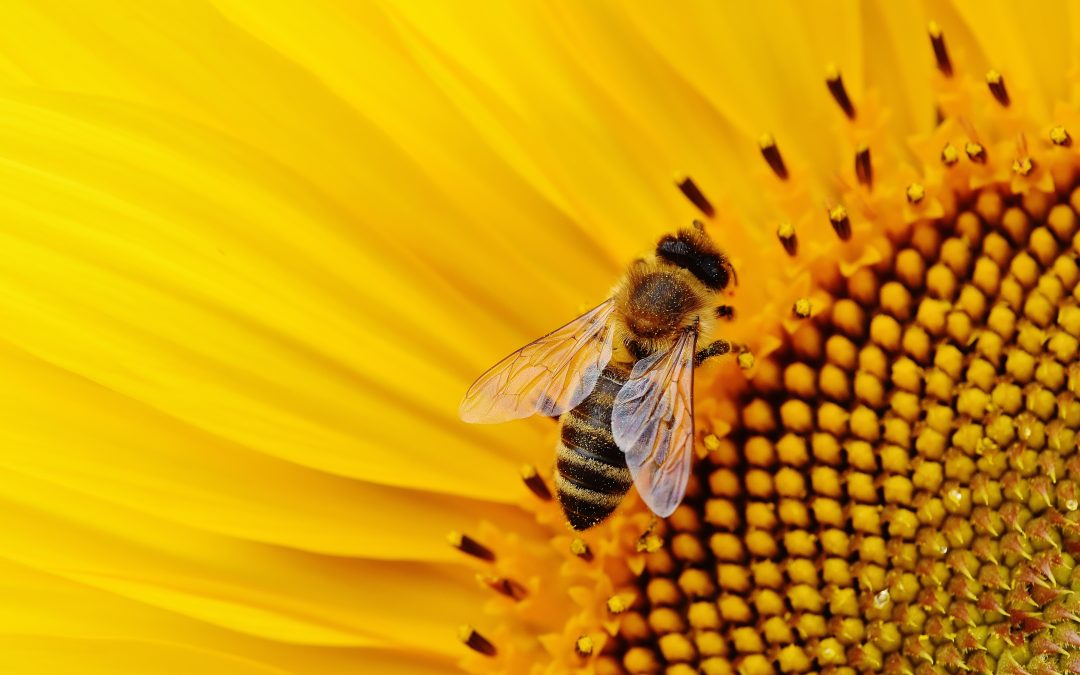By DEBORAH G. SCANLON
As they don their protective headgear and suits, Kathy and Brian Elder discuss their plan of action before they approach their beehives on their West Falmouth property. “Make a plan as soon as you suit up so you don’t get distracted,” Ms. Elder said.
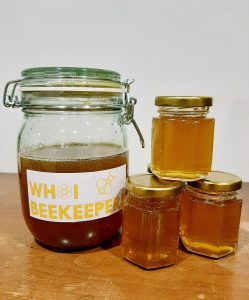
COURTESY WHOI BEEKEEPING PROJECT
WHOI beekeepers auctioned their honey to benefit the Falmouth Service Center in 2020 and sold it at the Barnstable County Fair in 2021.
Rule number one is to “be prepared, always get a good smoke” going, Ms. Elder said. “You probably won’t need it, but you’ll be very glad you have it when you do. The smoke calms the bees. If they are agitated, they will strike at you.” Mr. Elder lights up a small bellows with a fire made of pine needles and punky old logs and sprays the smoke around the hives as Ms. Elder approaches the bees.
The temperature is in the high 80s, which is too warm to treat them for mites, as they had planned, but they pull out a frame filled with bees to take a look. They have five hives with anywhere from 30,000 to 60,000 bees in each. Two are splits they made with purchased queens and frames taken from the other strong hives. Generally, a strong hive produces 25 to 30 pounds of surplus honey, aside from the 50 to 60 pounds they will need to overwinter. Honey bees don’t hibernate and will need the honey to regulate the temperature throughout the winter, leaving a total of 60 pounds for the bees for the winter.
The smoker has done its job, and the bees are content, and we marvel at the calm with which the Elders deal with the hives.
Later when the temperature cooled down, they used formic acid gel strips to treat the bees for mites—it kills both Varroa and tracheal mites. They learned that controlling Varroa is critical to successful overwintering of the hives. The acid fumes out and kills the mites, leaving no trace, but if the temperature is too high, it will kill some of the bees.
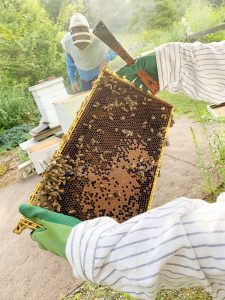
MARTHA SCANLON FISH
Kathy Elder inspects one of the frames from the brood chamber that contains cells with capped larvae and open cells where eggs have been laid by the queen in the bottom. Nurse bees will fill the cell with “bee bread” (a mixture of pollen and honey) and then cap the cell. A healthy young queen can lay over a thousand eggs in a single day.
Pesticides will leave a residue in the comb, and so they do not use those. Also, the mites develop a tolerance to repeated use of pesticides, and some commercial beekeepers were using more and more of it to achieve control.
In the late fall, they put strips infused with essential oils (thyme) to help control Varroa over the winter.
Ms. Elder became interested in beekeeping through their friendship with the late Herb Graham and his son David, both avid beekeepers. “Dave just showed up one day at our house with a hive of screened bees in the back of his truck and said, “Now where should we put it?” He and his father were excellent guides for a beginner beekeeper.”
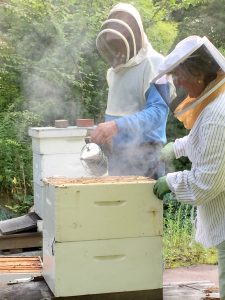
DEBORAH SCANLON
Brian Elder sprays smoke to calm bees as Kathy Elder opens the hive.
Herb Graham, who was director of the Woods Hole Fisheries Laboratory, had kept bees since he was 14. He was a founding member of the Barnstable County Beekeepers Association, where he gave a talk on queen-rearing when he was in his late 90s. Ms. Elder remembered he began the talk by telling the group that he had been keeping bees longer than most of the people in the room had been alive. “When moving his young family from Pennsylvania, he strapped a beehive to his Model A and drove it the whole way to California,” recalled Ms. Elder. People sometimes asked Herb about the secret to his long, healthy life, and he would reply: “Pure thoughts and a teaspoon of raw honey every day.”
One of the many benefits of raising bees is that they are an important part of our ecosystem, providing pollination that not only is key to the survival of plants but also produces about a third of the food that we eat. A recent initiative of the Woods Hole Oceanographic Institution’s Sustainability Task Force is the Beekeeping Project, which was begun in 2019 by Woods Hole Oceanographic Institution employee Danie Kinkade to support pollinators and spread awareness.
She and her husband enjoyed beekeeping, but because of their careers and travel, they didn’t have the necessary time. Ms. Kinkade, Ellen Bailey, Karen Soenen and Bethany Flower of WHOI gathered a group that now numbers about 45, composed of WHOI employees, retirees and others. She said only a handful have beekeeping experience, but there is great interest and it is an “open and welcoming group.” The experienced beekeepers share equipment and expertise, “ a stone soup type of collaborative.”
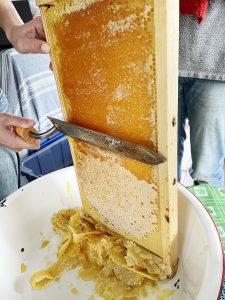
COURTESY WHOI BEEKEEPING PROJECT
A beekeeper extracts honey from the frame.
Two hives were started in 2020 with two different species. The group auctioned off its first batch of honey with proceeds going to the Falmouth Service Center. One hive did not survive the winter, though, and they are not sure why, but their new hive will have the species that did well, Saskatraz, developed in Saskatchewan, Canada, and better adapted to winter weather.
In 2021, Ms. Kinkade said there was a “modest harvest” of honey, which was sold through the Barnstable County Beekeeping Association at the Barnstable County Fair.
Their beehives are on WHOI’s Quissett campus, away from high traffic and near the cooperative gardens so that they have pollinating fodder nearby. The group is supported by WHOI and a grant from Woods Hole Foundation.
The group is gathering data each time they open the hives on pests, brood patterns, outside temperatures, food stores, queen sightings, et cetera, and a WHOI engineer has offered to create sensors for the hives to measure additional data.
Ms. Kinkade said there is increasing interest in beekeeping, and her group has found that both Barnstable County and Bristol County Beekeepers Associations’ schools have been so popular that the classes sell out. (During the pandemic, Bristol County’s was offered via Zoom; Barnstable County’s 2021 class was canceled.)
Honey from local beekeepers is available for sale at Coonamessett Farm, Mahoney’s Garden Center and Vital Nutrition, as well as at local farm stands and stores.

